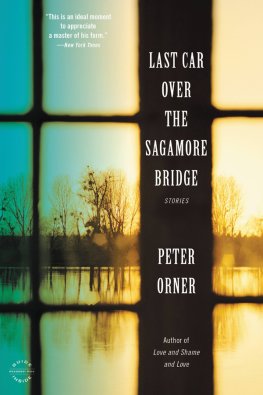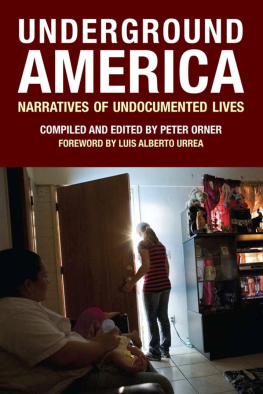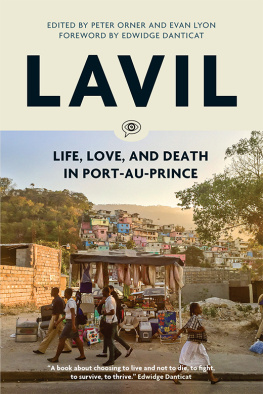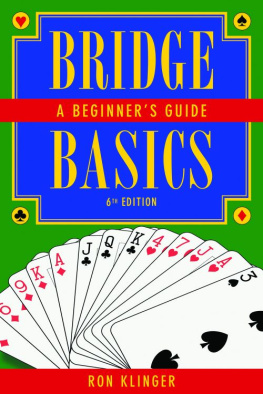Peter Orner
Last Car Over the Sagamore Bridge
For my mother, Rhoda Kaplan Pierce
and
Pat Strachan
Its over me like a ton of water, the things I dont know.
GINA BERRIAULT
Nate Zamost took that week off school. We wondered what he did those long days other than the funeral, which couldnt have taken more than a few hours. The Zamosts lived in one of those houses just across the fence from Foleys Pond. Nates sister, Barbara the family called her Babs slid under the chain link and waddled down to the water. This was 1979. She was two and a half.
The day Nate Zamost came back to school, we refrained from playing Kill the Guy with the Ball. At recess, we stood around in a ragged circle on the edge of the basketball court and spoke to one another in polite murmurs. We were a group of guys in junior high who hung out together. Its not like we werent capable of understanding. Some of us even had sisters. Instinctively, we seemed to get it that our role was not to understand, or even console, but, in the spirit of funerals, to act. That being authentically sorry, whatever this might have looked like, would have been out of place, even unwelcome. So we stood there and looked at our shoes and kicked at loose asphalt. Nate went along with it. He played chief mourner by nodding his head slowly. I remember Stu Barkus finally trying to say something.
Look, its not like its your fault, Stu said. I mean, how could you have known she knew how to slide under the fence?
Nate looked up from his shoes.
I taught her.
What could anybody say to that? Barkus took a stab. Hed always been decent like that.
Well, its not like you told her to do it when you werent looking.
I didnt?
Barkus had nothing to say after that. Nobody else did, either. We let the question hang there. Like Stu Barkus, Nate Zamost was a gentle guy. He was also the biggest of us and had a very hard head, but during Kill the Guy with the Ball, Nate would always go for your ankles and take you down easy. The rest of us were more interested in the raw clawing, the scrum and the mayhem, than in the ball itself. It was the killing-the-guy part. Yet whos to say what goes on behind closed doors between siblings? Nate, like all of us, was thirteen that year. His parents went out for a couple of hours and left him in charge.
Remembering all this now, what comes to me most vividly is my own private anger toward Nate, anger I can still summon. Foleys Pond had always been our secret place and now everybody in town knew all about it. It was wedged inside a small patch of woods, between where Kimball Avenue ended in a stand of bush and trees and the Edens Expressway fence. To the east was the public golf course. Some said the pond wasnt natural at all, that it had been created by runoff from the golf course, that it was nothing but a cesspool of chemicals. Proof of this theory was embodied by the large corrugated drainpipe that hung out over the edge of the pond. Whatever flowed from that pipe wasnt water. Once, Ross Berger dove into Foleys and rose up with green hair and leeches on his thighs. Someone shouted, It supports life!
We all stripped to our underwear and jumped in. It was like swimming in crude oil. A fantastic place, Foleys scragged, infested, overgrown, and gloomed long before Nate Zamosts sister wrecked it. How many mob hits, feet tied to bricks, bobbed and swayed at the bottom of that fetid swamp? All the missing kids in Chicago, all were dumped in Foleys
After school wed retreat to the pond and talk down the waterlogged afternoons. There was nothing beautiful about the place, even in April, except that it was ours. There is something overripe about spring in the Midwest, the wet and green world, the ground itself putrid, rotten, oozing. Foleys was protected by a canopy of trees. The sun crept through only in speckles. Foleys in the rain, the rain smacking the leaves, how hidden we were, talking and talking and talking about God only knows what. Had we been a few years older, we might have drunk beers or smoked joints or brought girls, so they could scream about not wanting to go anywhere near that nasty sludge. It was 1979 and we were thirteen and conspiratorial, and what was said is now out of reach, as it should be.
It took them eleven hours. Foleys was a lot deeper than anybody had thought. The fire departments charts turned out to be inaccurate. Police divers had to come up from Chicago. I think of their rubber outfits, their masks, their flippers, how they waddled along the edge of the pond like big penguins before descending, slowly, into the water. And something else that by now most people may have forgotten and newcomers would have no way of knowing. When they finally did recover her all those hours later, deep in the night, and laid Babs on the grass, Nates mother refused to acknowledge that the mottle of bloated flesh lit up by high-powered flashlights was her daughter or anybodys. Mrs. Zamost didnt know Foleys. Ross Berger was down there twelve seconds and came up looking like an alien. Mrs. Zamost didnt scream. She wouldnt even touch it. I was there, just outside the ring of lights. She wouldnt even kneel down and touch it, just shook her head and stepped backward into the dark.
Foleys is a real park now. The Park District manicured it. The trees have been trimmed. Theres a wide wood-chip path leading off Kimball Avenue. And theyve installed bird feeders, long poles topped with small yellow houses.
He met her at the Occidental in Buffalo, Wyoming. She was a maid at the hotel. Shed come west from Missouri not intending to do much more than stop and work for a few weeks before heading to California. But there was money to be made at the Occidental, especially during conventions. This was February 1912. Hed come for a convention. The state Republican Party was meeting to decide on a successor for McClintock. It was after nine in the morning. Shed knocked on the door twice and waited. Silence. She took the key out of her apron and unlocked the door. A man was sitting on the bed, pulling on a boot. His face was so still it could have been made of wax. His eyes. Even from the door, in the dim light, she could see them, huge and glassy and full of motion. Like small heads bobbing in water.
This one must have checked in late. She held the door.
Sir?
No, come in, come in. I was just, well Yes. Just. I was just. All right, then.
He pulled on his other boot and, edging his way past without touching her, left the room.
The Occidental wasnt elegant. It was sturdy. The winds of the high plains pounded it, and the hotel stood its ground. On rainy or snowy days, the cherrywood of the walls and all the furniture gave off a sweet, malty smell. She liked the hotel best in the early mornings when the smells in the thick silence were more pronounced than the noise. Noise could overpower so many other things.
Two nights later he said hed leave his wife for her. They were in her small room across the street and down the block from the hotel. He said shed ransacked his heart the moment she unlocked the door to his room. Youre not a housekeeper, he said. Youre a vandal.
You looked like you were about to weep, she said.
He laughed. Politics. I was thinking how we were going to have to settle for Gilhooley if Collins refused to stand. Gilhooley. As if that matters now. Let Gilhooley be King of Prussia!
Toward dawn he fell asleep. She watched the sun gray, then pink, the frost-crusted window. She saw how dingy and small the room was going to look to him when he awoke. A man with a house and daughters. This wasnt something she ever thought about. Men didnt look at her room. They looked at her. Her with her stockings on and her with her stockings off. One of his hands lay across her stomach like a plump fish. Moist. The fish rode the rise and fall of her stomach. She wanted it off. She wanted it gone. She had once loved a man in Cape Girardeau, but not enough had come of it. And yet it isnt this man or that man or any man at all. Isnt it the sun leaking through the window again? Isnt it the sun trying to melt this frost? Isnt it this narrow bed and breath dissolving into memory?












